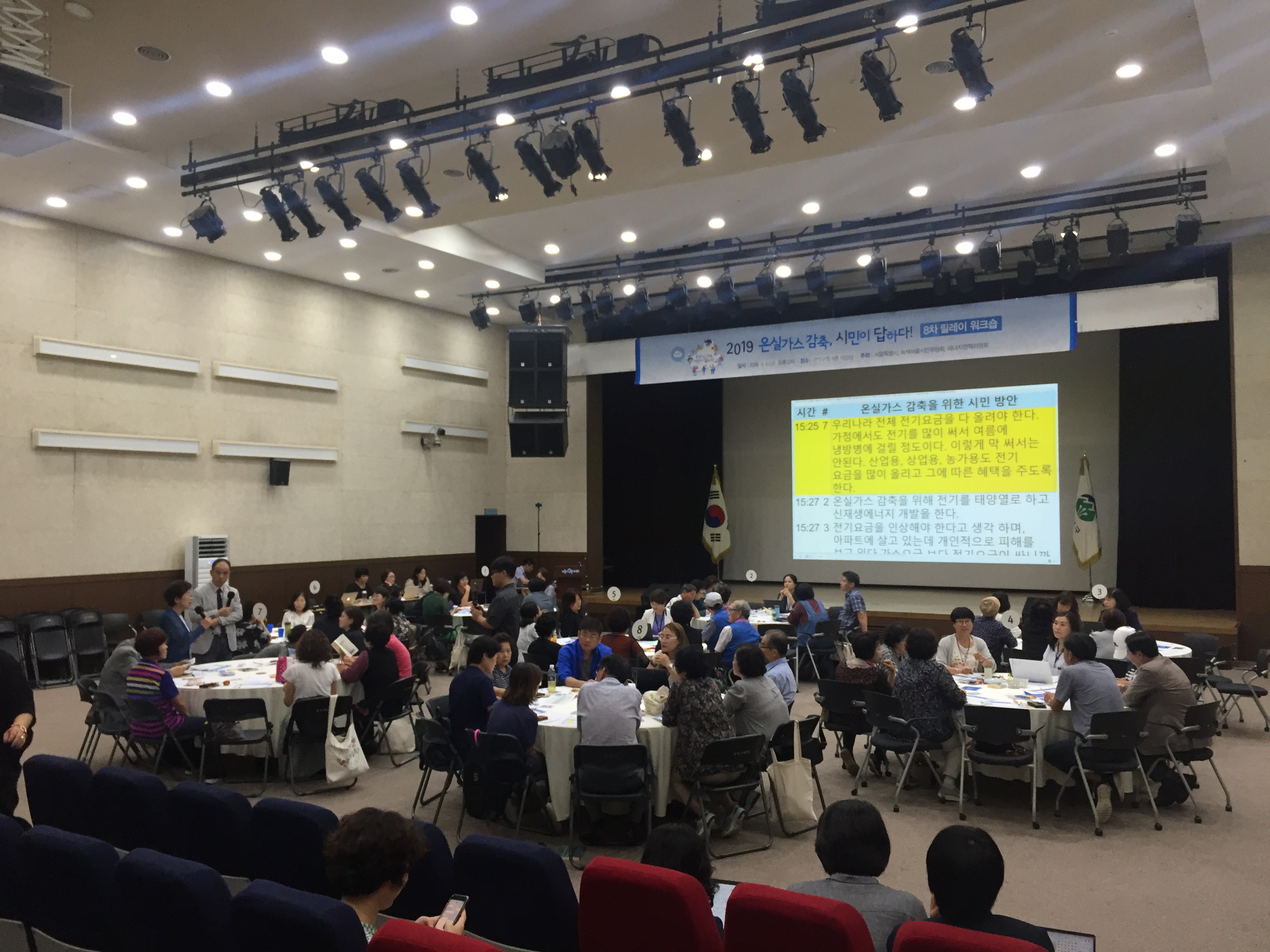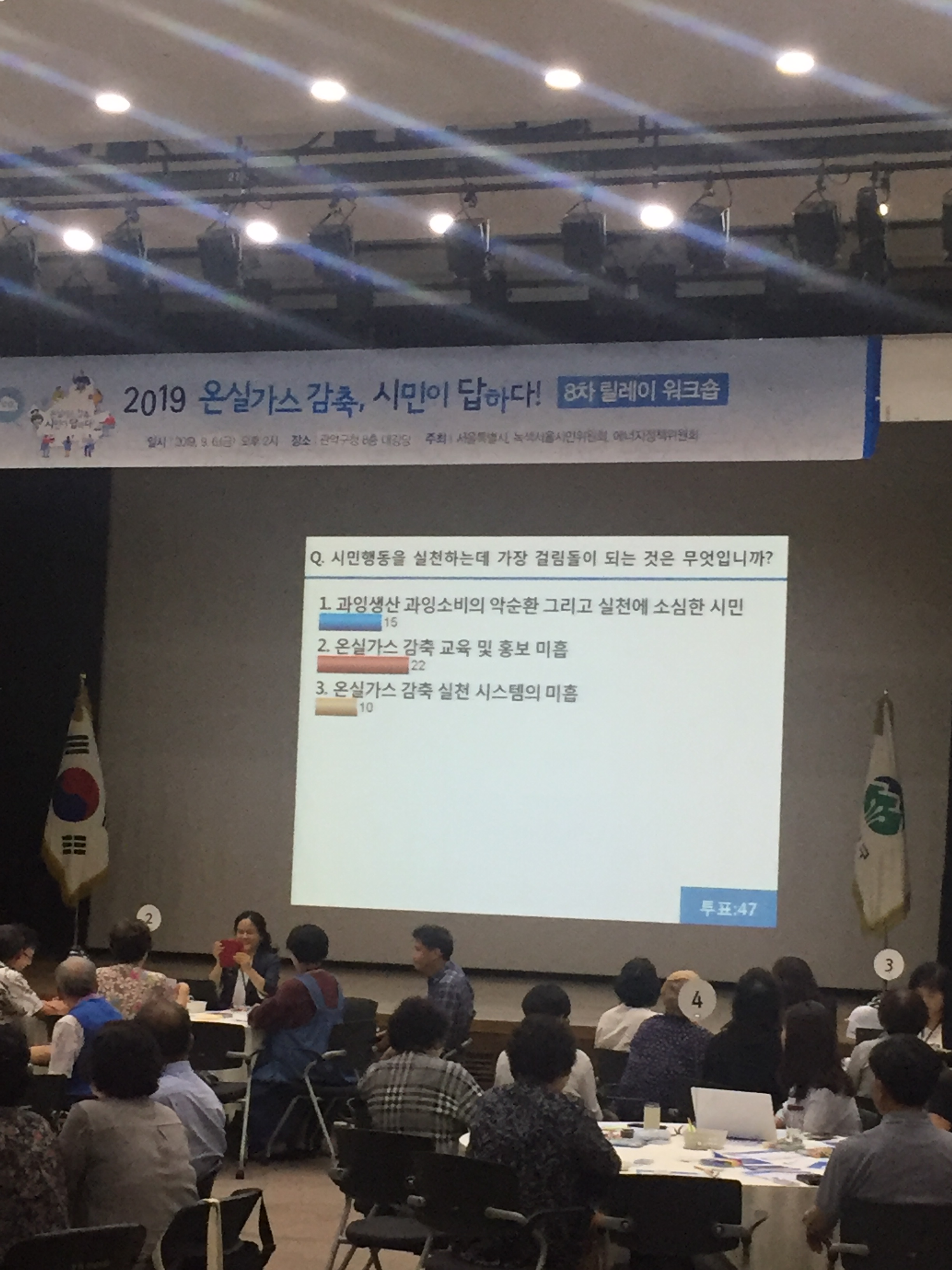How do citizens discuss the energy transition?: Mechanism, effect and challenge of citizen participatory methods in local energy planning in Korea.
 |
||
 |
Seona Park | |
 |
||
 |
US$3,000 |
Research Background Final Report (abstract) Others

citizen participatory planning 1

citizen participatory planning 2
Research Background
More and more people are paying attention to local governments' responsible responses, the process of developing Local Energy Plan(LEP) has become more important than ever. What is noteworthy here is that one of the government's six guidelines for setting LEP is citizen participatory planning. Therefore, most metropolitan governments in Korea are using citizen participation methods now.
The expansion of civic participation is becoming a challenge not only in Korea but also in countries such as Japan and Taiwan. The trials of Korea will partly answer the question of how to realize energy democracy, and then can be a good example for these countries.
Energy problems are still new to citizens. In particular, how people understand and discuss based on scientific facts from climate change to electricity becomes an important issue to plan citizen participation in energy issues. The understanding of scientific knowledge is the lowest civil science approach, and the knowledge-based deliberation is a new challenge of civic science. Thus, this research will make a significant contribution to the field of citizen science.
Analysis of the mechanism, which captures details close to participants, the effect of tracking long-term policy reflection processes, and challenges in processes and outcomes, can be applied to overall citizen participation principles. Two regions, Seoul and Gyeongnam, were selected to be analyzed in the use of citizen participation methodologies in the LEP.
To promote adequacy of research, abundant on-site field research will be held. Specifically, participation observation, in-depth interview, data collection, and a qualitative analysis will be conducted.
Citizen participation in the regional energy planning process is the first attempt in Korea. Therefore, there is no prior research in this field, and our research can generate leading research results. It is a highly valuable study that seeks to explore Korea's future path in the energy sector, including Korea's energy democracy, strengthening the community's energy autonomy, and expanding energy citizenship.
It can also give implication in practice and policy. Lack of public understanding of citizen participation can lead to just formal, meaningless events. Analysis of citizen participation methodology will promote usefulness in real-world cases.
[Sep. 2019]
Final Report (abstract)
As the national policy directions for Korea's energy transition became firm, the 3rd Basic Energy Plan was established and confirmed in 2019. Along with this, the Ministry of Trade, Industry and Energy encouraged local governments to re-establish local energy plans(LEP or Regional Energy Master Plan). The LEP is a plan of the sub-concept of the basic energy plan. In the Energy Act, local governments must establish and implement LEP every five years with a planning period of at least five years.
What is unique in the Korean case is that the central government has instructed the citizen-participatory plan to establish the LEP. Accordingly, citizen participation experiments were conducted in all 17 metropolitan local governments in 2019, and the final establishment was completed in May 2020. Citizens' participation in the LEP aroused interest and a lot of trial and error. The research question of this study is how citizens participated in the LEP in detail.
Research Framework
Smith, G. (2009) found the four criteria for evaluating participatory democracy: inclusiveness ("Are the qualifications for both procedural and content balanced for participation?"), popular control ("Are there any real influences in the policy-making process?"), considered judgment ("Is there any institutional process for citizens to receive information and to take into account the perspectives of other citizens?"), and transparency ("Is it sufficiently explained to both participants and citizens outside?").
To achieve the goal of this study, we adopted these four concepts to make our standard. We suggested three stages so that we evaluate citizen participation at a more specific level. The three stages are preparation, workshop, and governance.
Case introduction
The study sites are Seoul and Gyeongnam, each with different characteristics. Seoul is the capital city of Korea and is consumption-oriented because it does not have a power plant. Seoul actively works on energy transition. The Seoul Institute was in charge of the overall regional energy plan here, and the Seoul Government organizes the Seoul Energy Citizen Planning Team. They entrusted a discussion meeting to a workshop-specialized company.
Gyeongnam is Korea's representative industrial city, and there are many thermal power plants concentrated there. Due to its conservative atmosphere and industrial energy-oriented, it is lukewarm for the energy transition. In Gyeongnam, a private company commissioned and took charge of the whole energy planning, including running a workshop. Both provinces have conducted scenario workshops as a citizen participatory tool.
As May-June was the time for every LEP to be established, we collected data related to this. We grasped how citizen participation and governance were achieved in establishing the nationwide LEP in 2019-2020. From July to August, we interviewed how some participants and organizers evaluate citizen participation in LEP. The questionnaire was refined as the interview proceeded. Based on the collected data and the content of the interview, we tried to analyze the type, performance, error, and policy reflection of the citizen participation methodology used in the process, at the last period of the research.
Preparation
Essential points in the preparation are recruiting participants for inclusiveness and transparency and providing materials for considered judgment.
Seoul and Gyeongnam each recruited participants through their websites and social media channels. Seoul pursued the representativeness of the sampling for the scenario workshop. Seoul organizers tried to include teenagers while considering the population proportion, gender, and age among 25 districts. A sampling committee selected participants. Two hundred fifty-four people applied, and 120 were selected. The advisory committee verified the contents for citizen participants.
In contrast, Gyeongnam could not go under the sampling process because there were not plenty of participation. Fifty-three people could participate in the Gyeongnam scenario workshop. They could act under the name of a citizen planning team till LEP is completed. In other words, they qualified to engage in LEP not only at workshops in August and September 2019 but by February 2020.
Workshop
The workshop's main point is that it must be prepared faithfully to achieve inclusiveness or considered judgment in the discussion. In the perspective of popular control, an organizer should design a workshop to assure many bottom-up decisions.
Both cases organizers conducted three-day scenarios workshops between August and September 2019 and presented scenarios to citizen participants and discussed them. However, Seoul was far ahead of Gyeongnam in the degree of preparation of the process. Seoul used 4-6 hours a day, whereas Gyeongnam used it within 3 hours. In Seoul, three teams of experts who could well explain each scenario presented three scenarios. In Gyeongnam, a commissioned company prepared and presented four scenarios alone. In Seoul, a discussion-specialized company run the workshops, and a trained facilitator run each table. In Gyeongnam, the commissioned company did not put a discussion expert and a facilitator. On the first day of the Gyeongnam Workshop, one of the participants per table was designated as a group discussion manager. Since the group discussion managers did not complete any prior training, the discussions by table varied, and they did not accurately record the contents.
Above all, it was clear what to discuss and decide for each workshop day in Seoul, but not in Gyeongnam. It affected how citizens can make bottom-up decisions. In the case of Seoul, there is a limitation that experts did the scenario writing. However, it can be a citizen participation scenario because citizens reviewed, debated, and agreed. On the other hand, in Gyeongnam, scenarios were not determined from the bottom-up, and the results (priority of alternatives or conclusion of the discussion by citizens) on the four scenarios were unclear. During the discussion in Gyeongnam, participants' questions and opinions were not organized systematically.
Governance
Governance means a system to ensure popular control and transparency. It is necessary to evaluate how the result of citizen participation was reflected in policy, whether cooperation with civil society was successful, and whether there was an opportunity for citizen participation feedback in the subsequent LEP establishment process.
First of all, both local governments worked with a service agency rather than communicating with civil society. The contents and results of the discussion in Seoul were described in detail in the LEP report. Seoul government showed an attitude to refer to results of discussion as much as possible in its plan. Since Seoul already had an existing vision and goal, its activities wrapped up with the Citizen Declaration.
In Gyeongnam, it is not clear how the policy reflected the citizen participatory workshops. Its LEP does not describe the discussion process, contents, and results at all. Gyeongnam LEP Participation Group was set to work by the end date of the entire LEP establishment. Accordingly, participants were invited to the final report meeting in February 2020. During and after the workshop, the province kept social media open to provide an online space for their opinions.
Conclusion
Although citizen participatory LEP was done under one government policy, the two cases showed different appearances. In terms of governance, civic participation results were limited, so the citizens' role is considered limited. However, in Seoul's case, efforts were made to gather opinions from experts in various fields in the preparation. They described citizen participation in detail in the LEP report and showed the attitude of listening to citizens.
In the case of Gyeongnam, the preparation process was veiled, led by a private company. The discussion technic was insufficient, such as a workshop without a professional facilitator or clear agenda. As a result, civil society had many complaints that this workshop did not contain civic opinions. In Gwangju Metropolitan City, another case of LEP, scenario writing was also done by civic groups, so the degree of governance and bottom-up opinion decisions of citizens were high.
In this study, we constructed the framework according to the evaluation criteria of participatory democracy. The importance of each category was figured out through cases. This evaluation framework can serve as a reference for future application or planning attempts. Even though the framework focuses on the internal viewpoint of running a workshop, the reflexive governance is needed to develop LEP further. In other words, rather than a top-down approach that excessively demands that it be aligned with the plans of the central government, it is necessary to pursue a bottom-up approach through means such as data, analysis, and financial support.
Most local governments had many difficulties because the civic participation LEP was the first attempt. Still, if there is any significance of this LEP, it dealt with the energy issue from local and citizens' perspective, which was previously discussed more by the state and experts.
It is not easy to improve all dimensions of the LEP at once. The quality of citizen participation can be improved simply by faithfully preparing necessary debate skills, related to the second stage. In this study, we compared only two out of 17 local governments, which makes it possible to imagine a variety of discussion planning.
After the research
After these trials, data from each region were collected and evaluated through the Local Energy Transition Network in Korea. Therefore, we can expect more great evaluations other than this report. Researchers of this report will also try to develop the findings here to publish a paper on an international journal.
Based on these evaluations, it is necessary to create a manual for local energy planning through detailed feedback on the on-site workshop's progress. In other words, we need successive research that can be practically helpful.
Besides, we have to develop a guideline for local governments who are lukewarm in the energy transition. The lack of energy and discussion-technic expertise in some provinces should be solved through 1:1 consulting.
[Dec. 2020]
Others
